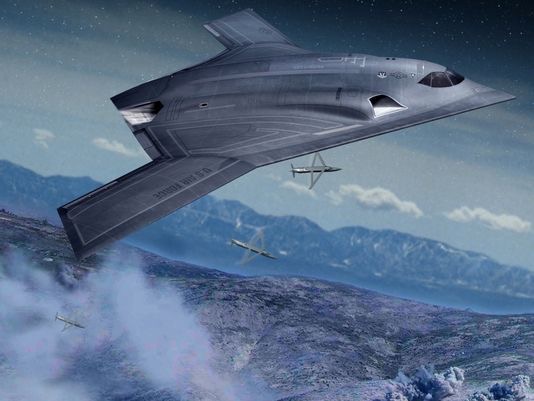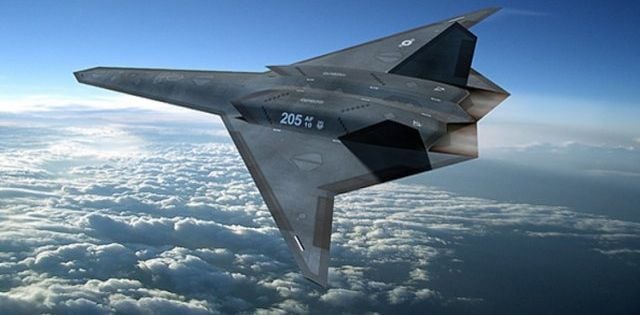GAO Upholds LRSB Award To Northrop; Boeing Glowers
Posted on
UPDATED: Adds Aboulafia Comment, SecAF, Boeing, Northrop Statements.
WASHINGTON: The Government Accountability Office upheld the Long Range Strike Bomber contract award to Northrop Grumman today, smoothing the way for one of the Pentagon’s highest priority programs and erasing fears that the dismissal of the service’s top acquisition official for his ties to Northrop might affect the decision.
UPDATE BEGINS However, about an hour after the protest decision was announced, Boeing issued a dark statement refusing to back off the fundamental premise of its protest: that “the government’s selection process was fundamentally and irreparably flawed.”
The company said it “will carefully review the GAO’s decision and decide upon our next steps with regard to the protest in the coming days. Given the significance of the LRS-B program, it could not be more critical that the government procure the most capable bomber to serve the warfighter, at the greatest value to the American taxpayer.”
This appears to signal that Boeing’s lawyers are combing through the details in the classified GAO decision to decide if the risks may be worth the possible gain in pursuing a court case. However, I understand no decision has been made.
Is that a smart move, I asked aviation expert Richard Aboulafia of the Teal Group? “You’ve got the Air Force, OSD and now the GAO saying no to Boeing. I think the overwhelming majority of opinion seems to be no,” he said. After all that, Boeing better have “a real silver bullet” to justify going to court.
Why then is Boeing not graciously nodding and congratulating Northrop? “I think they regarded this in many ways as a must-win contract,” Aboulafia told me, “and it’s tough to live in the aftermath of this and come up with a fallback plan.”
Air Force Secretary Deborah Lee James was clearly happy with the outcome of the GAO review. “The Air Force was confident that the source selection team followed a deliberate, disciplined and impartial process to determine the best value for the warfighter and the taxpayer,” she said in a statement. Her comment also seemed designed to counter Boeing’s arguments about cost and capability. “It is important to ensure affordability in this program and the ability to leverage existing technology as we proceed forward,” she said.
For its part, Northrop stuck to its guns, saying that the GAO decision “confirms that the U.S. Air Force conducted an extraordinarily thorough selection process and selected the most capable and affordable solution.” UPDATE ENDS
The battle lines in the protest looked pretty clear from the day of its filing. Northrop touted its skill at all-aspect stealth, low-rate production, and sensors. The Boeing-Lockheed team argues that the government should value its high-rate production skills and cost controls more highly.
“This looks like a replay of the [KC-46] tanker competition where Northrop bid aggressively and Boeing argued the government was not thinking rigorously [about cost and risk],” defense consultant Loren Thompson said when the protest was filed. “It failed to adequately assess risk of the competing proposal… how unlikely a successful execution by Northrop would be.” Thompson has dogs in the fights since his firm gets business from both Boeing and Lockheed.
The two companies’ press release announcing the protest said that “the cost evaluation performed by the government did not properly reward the contractors’ proposals to break the upward-spiraling historical cost curves of defense acquisitions.”
In English, that means the companies based their bid on new techniques to keep costs down, but the Pentagon scored the bids based on historical cost data — which of course is worse. In fact, the Air Force ended up doubling both competitors’ estimates for the development phase. Given the legacy of overruns on major weapons programs, it’s hard to argue with a conservative cost estimate, but Boeing and Lockheed tried.
The Air Force plans to buy at least 100 bombers.
Here’s the official GAO statement:
The following is a statement from Ralph O. White, Managing Associate General Counsel for Procurement Law, GAO, regarding today’s decision resolving the protest filed by The Boeing Company, B-412441, February 16, 2016
On February 16, 2016, the U.S. Government Accountability Office (GAO) denied a protest filed by The Boeing Company, Defense, Space & Security, of St. Louis, Missouri, challenging the Department of the Air Force’s award of a cost reimbursement contract to Northrop Grumman Corporation, of Redondo Beach, California, for engineering and manufacturing development, and early production, of the Long Range Strike Bomber. Boeing argued that the Air Force’s evaluation was fundamentally flawed with respect to the assessment of the offerors’ proposed costs, and the technical evaluation of Northrop’s proposal.
The current contract for the Long Range Strike Bomber is comprised of two parts–the Engineering and Manufacturing Development phase and the subsequent options for the production of the first 21 aircraft. As initially announced by the Air Force, the Engineering and Manufacturing Development phase has an estimated value of $21.4 billion in 2010 dollars. The Air Force has not provided a public figure for the production cost of the first 21 planes, and the total cost of this contract is classified. The Air Force has explained that “the fixed price production award supports the average per unit cost of $511 million per aircraft (stated in 2010 dollars with a production purchase of 100 aircraft).”
GAO reviewed the challenges to the selection decision raised by Boeing and has found no basis to sustain or uphold the protest (emphasis added). In denying Boeing’s protest, GAO concluded that the technical evaluation, and the evaluation of costs, was reasonable, consistent with the terms of the solicitation, and in accordance with procurement laws and regulations.
The details of Boeing’s challenges, and GAO’s decision resolving them, are classified and covered by the terms of a protective order issued by GAO for the protest. Accordingly, this decision must undergo a security classification review by the Air Force, and is not available for public release.
Subscribe to our newsletter
Promotions, new products and sales. Directly to your inbox.


